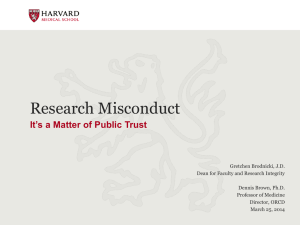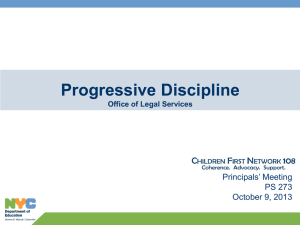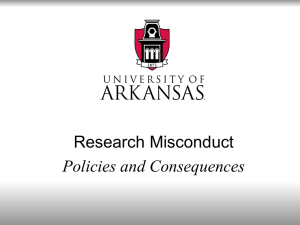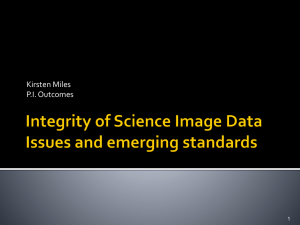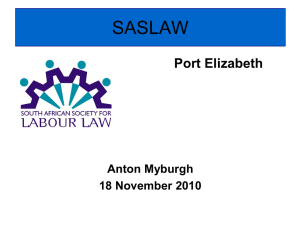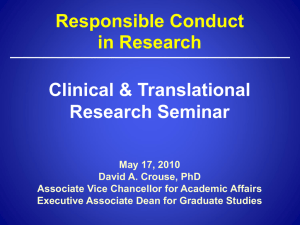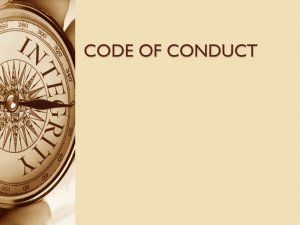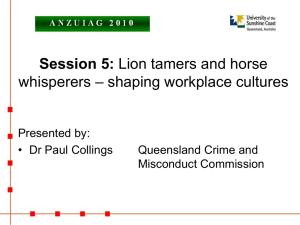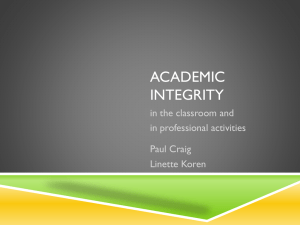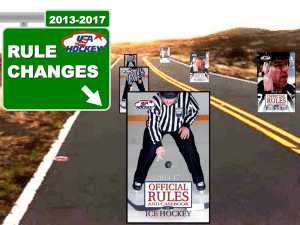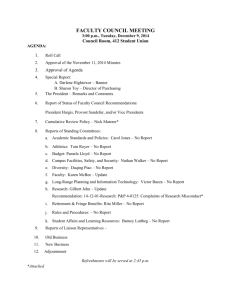Presentation Title - Office of Research Compliance
advertisement
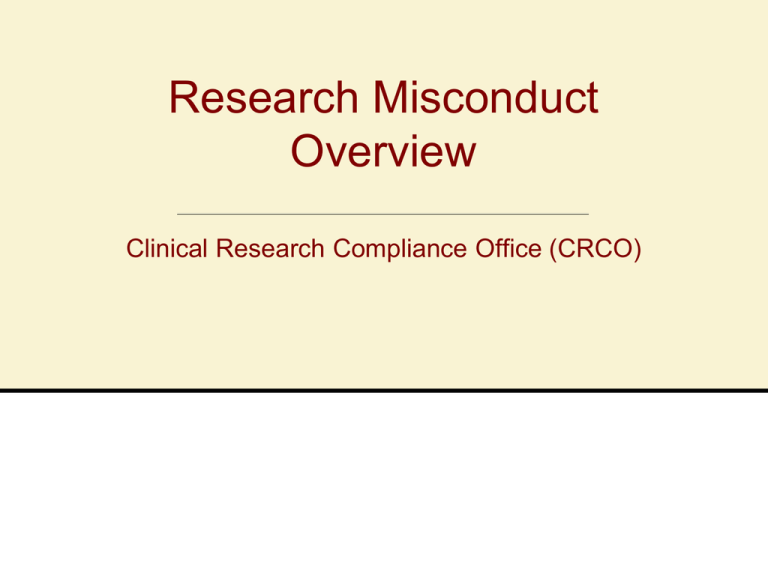
Research Misconduct Overview Clinical Research Compliance Office (CRCO) Background: Lessons learned in 1970s &1980s Historical Research Misconduct Incidents • No general rules governing academic conduct • Evidence hard to collect • Expertise needed to investigate • Varied standards for judging misconduct • Conflict of interest concerns • Complex and difficult task •Self-policing and self-regulation in science was not limited to scientists or university policy makers • Doubt on the efficacy of the peer review system 1974: William Summerlin accused of fabricating data by using a marker to make black spots on white mice 1981: John Darsee, a postdoctoral fellow at Harvard, accused of fabricating data. 1982: William Broad and Nicholas Wade publish Betrayers of Truth, claiming that there is more misconduct in science than researchers want to admit. 1984-1993: Luc Montagnier accused Robert Gallo misappropriating an HIV strain. 1987: NIMH panel concludes that Steven Breuning fabricated and falsified data in 24 papers. 1987: Martin Luther King accused of plagiarizing his Ph.D. dissertation. 1987-1996: Imanishi-Kari accused of fabricating or falsifying data. The ensuing investigation leads to inquiries by M.I.T. and Tufts as well as the N.I.H. and a Congressional committee chaired by Rep. John Dingell. Nobel Prize winner David Baltimore is one of the co-authors on the disputed paper. Nicholas H. Steneck, “Research Universities and Scientific Misconduct: History, Policies, and the Future” David Resnik, Research Ethics Timeline (1932-Present) Link: http://www.niehs.nih.gov/research/resources/bioethics/timeline/ Historical Research Misconduct Incidents Background: Lessons learned in 1970s &1980s 1985 Health Research Extension Act and subsequent legislation relating to the National Science Foundation required universities to (1) develop mechanisms for dealing with scientific misconduct and (2) report activities relating to scientific misconduct to the federal government. By March 1989 most of the major and about half of the middle range research universities reportedly had adopted scientific misconduct policies Nicholas H. Steneck, “Research Universities and Scientific Misconduct: History, Policies, and the Future” 1989: The PHS forms two agencies, the Office of Scientific Integrity and the Office of Scientific Integrity Review to investigate scientific misconduct and provide information and support for universities. It also amends its definition of misconduct. The two agencies are reorganized in 1992 as the Office of Research Integrity (ORI). 1989: The NIH requires that all graduate students on training grants receive education in responsible conduct of research. 1992:NAS publishes Responsible Science: Ensuring the Integrity of the Research Process. The book estimates the incidence of misconduct, discusses some of the causes of misconduct, proposes a definition of misconduct, and recommends some strategies for preventing misconduct. 1994-1995 The Ryan Commission, convened by the NIH, holds meetings on scientific misconduct. David Resnik, Research Ethics Timeline (1932-Present) Link: http://www.niehs.nih.gov/research/resources/bioethics/timeline/ What is Research Misconduct ? Fabrication, Falsification, and/or Plagiarism when proposing, performing or reviewing research, or in reporting research results. Fabrication: Making up data or results Falsification: Manipulating materials, equipment or processes, or changing/omitting data or results such that the research is not accurately represented in the research record Plagiarism: Appropriating another person’s ideas, processes, results, or words without giving appropriate credit. IU Policy and Procedures Link: http://www.researchadmin.iu.edu/Policies/PoliciesProceduresOnResearchMisconduct.pdf Principles of Research Integrity • • • • • • • • • • Responsible conduct of research Self-policing Mechanisms for dealing with scientific misconduct Policy and procedures Monitoring research misconduct Promotes intellectual honesty and trust of science Ethical research System of checks and balances Protection of whistleblowers Safe environment to explore science and inquiry Office of Research Integrity (ORI) ORI oversees Public Health Service (PHS) research integrity activities on behalf of the Secretary of Health and Human Services with the exception of the regulatory research integrity activities of the Food and Drug Administration. ORI’s Research Misconduct Responsibilities Include •Developing policies, procedures and regulations related to the detection, investigation, and prevention •Reviewing and monitoring investigations conducted by applicant and awardee institutions, intramural research programs, and the Office of Inspector General in the Department of HHS. •Recommending findings and administrative actions to the Assistant Secretary for Health for decision, subject to appeal •Assisting the Office of the General Counsel (OGC) to present cases before the HHS Departmental Appeals Board; providing technical assistance to institutions that respond to allegations of research misconduct. Office of Research Integrity About ORI Link: http://www.researchadmin.iu.edu/Policies/PoliciesProceduresOnResearchMisconduct.pdf Policy and Procedures on Research Misconduct at IU Policy • Obligation to report research misconduct • Obligation to cooperate in the conduct of an Inquiry and/or Investigation • Ensures honesty and research integrity and responsible conduct of research Procedure Allegation→ Inquiry→ Investigation Allegation: A written allegation of misconduct that triggers the procedures described by this policy. Inquiry: The process for information gathering and preliminary fact-finding to determine if a charge or apparent instance of Research Misconduct has substance & therefore warrants an Investigation. Investigation: The process for the formal examination and evaluation of all relevant facts to determine whether Research Misconduct occurred, and, if so, the responsible person and the seriousness of the misconduct. IU Policy and Procedures Link: http://www.researchadmin.iu.edu/Policies/PoliciesProceduresOnResearchMisconduct.pdf Roles within the Policy • • • • • • • • • Complainant Respondent Research Integrity Officer (RIO) Standing Committee on Research Integrity Deciding Official (DO) Inquiry Committee Investigation Committee University Counsel Office of Research Integrity (ORI) IU Policy and Procedures Link: http://www.researchadmin.iu.edu/Policies/PoliciesProceduresOnResearchMisconduct.pdf Procedures at IU Allegation→ Inquiry→ Investigation Allegation • Receive and review allegation • Informal meetings with involved parties • Collaborate with University Counsel, Standing Committee on Research Integrity • Collection of any information needed at this stage to determine a recommendation • Consult with Office of Research Integrity • Recommendation to the Deciding Official, Dr. José Inquiry • Sequestration • Appointment of an Inquiry Committee • Notification of the Complainant(s), Respondent(s), and Dean • Meetings with the Inquiry Committee, RIO, and University Counsel • Interviews with the Complainant(s) and the Respondent(s) • Collection of information requested by the Inquiry Committee (e.g. Grants Office) • Consult with Office of Research Integrity • Inquiry Committee Report (allegation, process, findings, and recommendation) • Final Inquiry Record to Deciding Official, Dr. José • Deciding Official makes determination and any sanctions • Completed within 60 calendar days of initiation Procedures at IU (Cont’d) Allegation→ Inquiry→ Investigation Investigation • Report and Collaborate with the ORI • Appointment of an Investigation Committee • Notification of the Complainant(s), Respondent(s) • Notification to external funding agencies • Notification to appropriate governmental offices • Commencement within 30 calendar days of determination • Investigation may be conducted through private interviews or at a hearing • All interviews or hearings are taped and transcribed and shared with each interviewee • Investigation Committee Report (allegation, process, findings, and recommendation) • Submitting report to Deciding Official, Dr. José • Deciding Official makes determination and any sanctions • Submitting report to ORI • Notifications to the involved parties • Investigation should be completed within120 days of initiation How to Report Research Misconduct at IU Contact Research Integrity Officer Shelley Bizila: (317) 274-5524 sbizila@iu.edu Anonymous Hotline at IU (877) 526-6759 Anonymous Web Alert link at IU https://iu.alertline.com/gcs/welco me Office of Research Administration Research Integrity Link: http://researchadmin.iu.edu/cs-researchint.html 2012 Federal Agency Research Misconduct Finding Calleen S. Zach a former Research Assistant and Data Base Manager at Creighton University – Findings – falsified subject enrollment numbers in applications to NIH, a no-cost, one-year extension request, an application for additional funding, and falsified reports to the Creighton University IRB. – Sanctions (5 Years) – debarred from eligibility for any contracting or subcontracting with any agency of the US government and from eligibility for, or involvement in, nonprocurement programs of the US government. Prohibited from serving in any advisory capacity to the U.S. Public Health Service. Office of Research Integrity Case Link: http://ori.hhs.gov/content/case-summary-zach-calleen-s 2011 Federal Agency Research Misconduct Finding Gerald Lushington, Ph.D., Director of the Molecular Graphics and Modeling Lab at Kansas University and Director of the KansasDeA Network of Biomedical Research Excellence – Findings – approved publication of three articles and one abstract he knew contained significant amounts of plagiarized text from other writers’ published papers. – Voluntary Settlement Agreement (2 year period) any U.S. Public Health Service-supported research supervised, a plan for supervision of his PHS-related duties submitted to ORI, a summary report detailing how KU has ensured that Respondent's research and language in PHS grant applications and reports of PHS-supported research have been verified to be his own and accurately reported. An annual summary, provided by any institution employing him to provide assurance that PHS funds, or report, manuscript, or abstract involving PHS-supported research in which Respondent was involved, was based on actual experiments or was otherwise legitimately derived… Office of Research Integrity Case Link: http://ori.hhs.gov/content/case-summary-lushington-gerald 2010 Federal Agency Research Misconduct Finding Emily M. Horvath a former graduate student at IU Findings falsified original research data when entering values into computer programs for statistical analysis with the goal of reducing the magnitude of errors within groups, thereby gaining greater statistical power. Falsified figures in a NIH grant application, multiple publications, and in her Ph.D. thesis. Voluntary Settlement Agreement (3 year period) excluded from serving in any advisory capacity to the U.S. Public Health Service, cannot participate in any PHS-supported research until a supervisory plan is submitted to federal agency (ORI) and approved, and will write letters to journals editors of the published papers what she falsified/fabricated. Office of Research Integrity Case Link: http://ori.hhs.gov/content/case-summary-horvath-emily-m Downstream Effects • Validity of the science • Damaged reputations/careers • Collateral damage
